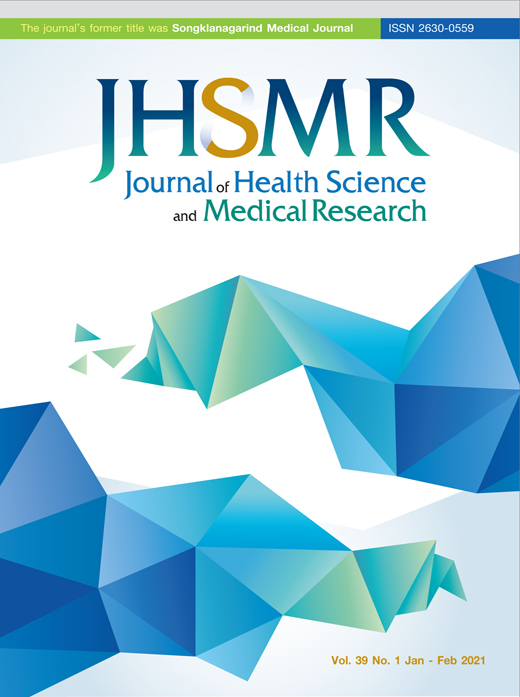Cultural Competence Perspectives From Nurses in Four Asian Countries: A Qualitative Descriptive Study
DOI:
https://doi.org/10.31584/jhsmr.2020767Keywords:
Asian nurses, cultural competence, perceptionsAbstract
Objective: This study aimed to describe the perception of cultural competence (CC) among nurses of four Asian countries.
Material and Methods: A descriptive qualitative study was carried out, including fourteen nurses for in-depth interviews and 63 nurses for 8 focus group discussions being purposively selected from four Asian countries. Data were analyzed based on content analysis.
Results: The participants defined CC as similar to cultural care, and described their CC in four main themes: (1) caring focus for patients with different cultures, (2) valuing holistic care/ patient-centered nursing, (3) preparing for living with God or Buddha, and (4) considering the social norms and patient rights. Assessment of the patient’s cultural background and myths contrary to medicine, along with having professional nursing knowledge, skills, and experience were the components of CC.
Conclusion: The participants have addressed their CC in providing culturally, congruent care with a universal, holistic, and empathetic approach. Nurses should be trained to develop skills in multicultural care and language and made aware of their patients’ cultural beliefs. Further, CC scales for nurses working in the selected, four Asian countries should be developed.
References
Almutairi AF, Adlan AA, Nasim M. Perceptions of the critical cultural competence of registered nurses in Canada. BMC Nursing 2017;16:1-9.
Bjarnason D, Mick J, Thompson JA, Cloyd E. Perspectives on transcultural care. Nurs Clin N Am 2009;44:495-503.
Jeffreys MR. Teaching cultural competence nursing and health care: inquiry, action, and innovation. 3rd ed. New York: Springer Publishing; 2016.
Busher Betancourt DA. Madeleine Leininger and the transcultural theory of nursing. The Downtown Review 2016;2:1-7.
Edes B. Migration in Asia: where is everybody going? [monograph on the Internet]. Metro Manina: Asian Development Blog; 2019 [cited 2020 Mar 2]. Available from: https://www.weforum. org/agenda/2019/02/migration-in-asia-where-is-every body-going
The Economist. Daily chart- migration and labour shortages in Asian countries [monograph on the Internet]. London: The Economist Newspaper Limited; 2017 [cited 2020 Mar 2]. Available from: https://www.economist.com/graphic-detail/2017/02/10/migration-and-labour-shortages-in-asiancountries
Invest in ASEAN. Diverse ASEAN [monograph on the Internet]. Jakarta: The Association of Southeast Asian Nations; 2017 [cited 2020 Mar 2]. Available from: http://investasean. asean.org/index.php/page/view/about-the-asean-region/ view/707/newsid/930/diverse-asean.html
Wesolowska K, Hietapakka L, Elovainio M, Aalto AM, Kaihlanen AM, Heponiemi T. The association between crosscultural competence and well-being among registered native and foreign-born nurses in Finland. PLoS ONE 2018;13. doi: 10.1371/journal.pone.0208761.
Maier-Lorentz MM. Transcultural nursing: its importance in nursing practice. J Cult Divers 2008;15:37-43.
Campinha-Bacote J. The process of cultural competence in the delivery of healthcare services: a model of care. J Transcult Nurs 2002;13:181-4.
Suhonen R, Saarikoski M, Leino-Kilpi H. Cross-cultural nursing research. Int J Nurs 2009;46:593-602.
Loftin C, Hartin V, Branson M, Reyes H. Measures of cultural competence in nurses: an integrative review. Sci World J 2013;2013:1-10.
Substance Abuse and Mental Health Services Administration, U.S. A treatment improvement protocol: improving cultural competence [monograph on the Internet]. Rockville, Maryland: U.S. Department of Health and Human Services; 2014 [cited 2020 Mar 2]. Available from: https://store.samhsa.gov/sites/ default/files/d7/priv/sma14-4849.pdf
Pasadilla GO. Social security and labor migration in ASEAN [homepage on the Internet] Tokyo: Asian Development Bank Institute; 2011 [cited 2020 Mar 2]. Available from: https://www. adb.org/sites/default/files/publication/157275/adbi-rpb34. pdf
Wong LP. Focus group discussion: a tool for health and medical research. Singapore Med J 2008;49:256-61.
Brouneus K. In-depth interviewing: the process, skill and ethics of interviews in peace research. In: Hoglund K, Oberg M. editors. Understanding peace research: methods and challenges. London: Routledge; 2010;p.130-45.
van Nes F, Abma T, Jonsson H, Deeg D. Language differences in qualitative research: is meaning lost in translation? Eur J Ageing 2010;7:313-6.
Lincoln Y, Guba E. Establishing trustworthiness. In: Bryman A, Burgess RG, editors. Qualitative research (volumes III). London: Sage Publications; 1999;p.397-444.
Songwathana P, Siriphan S. Thai nurses’ cultural competency in caring for clients living in a multicultural setting. Pacific Rim Int J Nurs Res 2015;19:19-31.
Shepherd SM, Willis-Esqueda C, Newton D, Sivasubramaniam D, Paradies Y. The challenge of cultural competence in the workplace: perspectives of healthcare providers. BMC Health Serv Res 2019;19:135-46.
Leininger MM, McFarland MR. Culture care diversity and universality: a worldwide theory for nursing. 2nd ed. Sunbury, MA: Jones & Bartlett Publishers; 2006.
Huerta CG, Kranz P, Maville JA. Perception of cultural competence in nurse practitioners. J Nurs and Health Sci 2015;9:1-16.
Centre for Research & Education on Violence Against Women & Children. What does it mean to be culturally competent? [homepage on the Internet]. Ontario: Centre for Research & Education on Violence Against Women & Children [cited 2020 Mar 4]. Available from: http://makeitourbusiness. ca/blog/what-does-it-mean-be-culturally-competent
de Guzman RMT, Durden TR, Taylor SA, Guzman JM, Potthoff KL. Cultural competence: an important skill set for the 21st century [monograph on the Internet]. Agricultural Hall, Lincoln, United States: Nebraska Extension; 2016 [cited 2020 Mar 5]. Available from: http://extensionpublications.unl.edu/assets/ html/g1375/build/g1375.htm
Sherwood J. What is cultural competence? [monograph on the Internet]. Camperdown NSW: National Center for Cultural Competence, The University of Sydney; n.d. [cited 2020 Mar 5]. Available from: https://sydney.edu.au/nccc/aboutus/ what-is-cultural-competence.html
Lin MH, Wu CY, Hsu HC. Exploring the experiences of cultural competence among clinical nurses in Taiwan. Appl Nurs Res 2019;45:6-11.
Andrews MM, Boyle JS. Transcultural concepts in nursing care. 5th ed. Philadelphia: Wolters Kluwer/Lippincott Williams & Wilkins; 2008.
Downloads
Published
How to Cite
Issue
Section
License

This work is licensed under a Creative Commons Attribution-NonCommercial-NoDerivatives 4.0 International License.
























